- Home
- Roberto Saviano
Savage Kiss Page 15
Savage Kiss Read online
Page 15
“It doesn’t mean a thing that you came out of my belly.” She looked him up and down, from head to foot.
“Oh, ja’,” said Biscottino, “you’re just playing with me—”
“I want to understand,” she interrupted him, “if there’s a scratch, a wrinkle, if the color of the eyes has changed.”
“What are you saying, Ma, it’s me, I’m still the same!”
“No, let me look closely.” She started touching him all over, scrupulously, like a mother chimp poking for fleas in the fur of her baby. Biscottino squinted his eyes, shook his head, laughed and huffed in annoyance, all at the same time, amused and irritated, the way he used to be until very recently when his mother insisted on giving him a kiss at all costs, planting her lips on those chubby cheeks of his. And he would push them away, those kisses, because by now he was too big for that gooey smooching, the kind of attention you’d lavish on a newborn baby.
“Leave me alone, ja’!”
“But I don’t think anything changed, and maybe that’s why I never noticed.”
“What did you think was going to change?” asked Biscottino. He was about to ask her if she’d lost her mind, but those eyes scrutinizing him were determined, confident, the opposite of madness. “What was supposed to change?” he asked again softly, with the smile still lingering, not yet fading.
“The face changes when you kill a person.”
Biscottino did the only thing he could do. Fake it.
He turned his back on her in silence, opened the fridge, shut it, then got out the jar of Nutella and went in search of a piece of bread. “What on earth are you talking about, Ma?” he asked, in the most relaxed and unruffled tone he could muster, and stuck his finger directly into the chocolate spread. “What’s happening?” he asked again, his lips smeared with the brown cream. “Did someone tell you some bullshit made-up story?” But he wouldn’t look at her.
At last, she started slapping herself in the face, hands open, and talking to herself all the while: “This is what you were capable of bringing into the world: a murderer son. A murdered husband and a murderer son. This is the gift you could offer this beautiful city.”
“Ma, hold still! Cut it out!” Biscottino dropped the Nutella jar and grabbed his mother’s arms. “Hold still!”
“This is the only gift I could give this country,” she went on. Her voice was steady, but careful not to overpower the volume of the TV. “And I’m worse than this city and worse than this country.”
“What’s happening?”
“What’s happening is that you’ve become a murderer, Edua’.” Her face was flame red, but her eyes were still the same as before.
“What the fuck are you talking about?!” snapped Biscottino, recoiling from her gaze and slamming his fists down on the table.
“I know everything, Edua’, I know everything.” She kept repeating his name as if it were a rosary, as if to remind herself just who the person was that she had before her.
“Actually, you don’t know a thing, Ma, you don’t know anything. That’s why you took Susy and Michelino to stay with Nonno and Nonna, so you could put on this show?”
“Edua’, now how are we supposed to get out of this situation? How are we going to get out of it, Edua’?” And she braced both elbows on the table and took her head in her hands.
“Ma, I don’t know what’s happened,” said Biscottino. “Who told you this nonsense, what housewife started running her mouth?”
Those words hit her like a whipcrack: she, too, had denied as long as she’d been able. Now, that’s enough, she told herself, this is no longer the time for this. She reared up above him, a good handful of inches taller than him, and gave him a backhanded smack to the mouth: “Stop lying!”
“Oh, go fuck yourself,” shouted Biscottino, and ran out the door, pursued by his mother, who was shouting threats: “Don’t you dare, Edua’! Don’t you dare!”
Biscottino leaped easily onto his mini-quad. Out of here, he thought to himself, I have to get out of here.
His mother’s voice kept coming closer, but by now he’d got the key into the ignition, had one hand on the throttle, and the engine roared into life, freed of the speed limiter.
“Eduardo! Edua’!… Biscottino!”
Biscottino sat there, finger in midair, over the electric starter button. His mother had never before called him by his nickname, his moniker. He turned to look at her.
“Biscottino,” she said again. She hurried over to him, and, where she had originally been planning to straight-arm smack him, now she reached out and caressed him. “That’s what they call you in the paranza, isn’t it? Even that name comes from me, because I always used to bring you biscotti, I always brought you cookies.”
“No,” he said, with a smile, “it’s because when we were playing soccer, you’d shout: ‘Edua’, vienet’a piglià ’o biscottino,’ but I didn’t want to come get a cookie.”
“Come inside.”
Biscottino got off the mini-quad and went back inside with his mother. Hand in hand.
“Is it true that you killed him?” she asked him, once they were both back inside the basso. She got down on her knees so that her face pushed right into her son’s, her eyes leveled at his. But Biscottino was staring down at the floor and wouldn’t speak.
“You can tell me, can’t you?”
Biscottino shook his head no, but it was a feeble gesture, incapable of undermining such a grave accusation. But to say yes, he’d have had to muster much greater strength, and, there and then, in his mamma’s presence, he just couldn’t find it.
She lifted his chin so he had to look at her. And her hand trembled as she did so; her hope was null, a distant gleam you can no longer put faith in.
“Let’s do this: just like when you were teeny-tiny. If it’s true, give me a kiss, okay?”
And her cheek received the dampish kiss, a childish kiss.
EXCURSION TO MILAN
In Nicolas’s head, the dots were all being connected with extreme precision. Soon he’d be able to see the whole picture, which, mission after mission, was starting to become clear. After the elimination of Mojo, he’d punctually received the phone call from the lawyer Caiazzo, providing the information that he’d requested as payment: the time had come for a little excursion to Milan.
None of them had ever been there before, and the idea of that trip prompted a sort of fascination mixed with repugnance. Drone had taken care of making the reservations and buying the tickets. Six seats in car number 8 of the Naples–Milan train for the men of the paranza and six for their girlfriends, three cars back. Far enough away, but still reachable in no more than a handful of minutes.
Drone was taking part in the plan from a distance: what they needed was girls, and he had two or three, but utterly virtual, voices and faces, whispers and bodies that bonded with him through the screen. No, in this case what was needed was physical presence. Biscottino, too, stayed home; at his age he still thought about soccer much more than he did about women. This was the first time he wasn’t elbowing his way in to take part in an operation. In fact, no, Maraja mused: at the wharf, too, Biscottino had accepted being kept out of it without too strenuous an objection. Maybe he didn’t have what it takes to be a professional killer; killing Roipnol must have troubled him much more than it had seemed in the immediate aftermath. In any case, he’d worry about that later, what mattered now was to connect the dots, and fast. “If you want to take everything for yourself, fine, take it all, but I mean all of it,” his mother had told him.
Letizia couldn’t wait to go: Milan, the capital of shopping, Valentino, Prada, Dolce & Gabbana, Versace, Armani! But she wanted to travel with Nicolas. “We look like we’re carrying weapons,” Nicolas had explained to her. “On the train I need you to keep the bags with the weapons.” And he’d pulled her close, kissing her. She’d gotten a little scared, she’d repeated that she didn’t want to know about it, she wanted to stay out of his business, but then he’d
laid down his ace of spades: once they got to Milan, he’d take her to Via Montenapoleone, to Via della Spiga. Shopping unlimited. He’d tag along behind her without a complaint, her every wish would be his command. “I’ll buy you the Madonnina off the top of the Duomo,” Nicolas had told her, and she’d clapped her hands like a little girl.
At the same time that Nicolas was talking Letizia into it, the other members of the paranza were securing the cooperation of their respective girlfriends. The most enthusiastic of them all was Sveva, the only one who cared little about buzzing from one shop to another. It was specifically the prospect of concealing weapons and running the attendant risks that appealed to her. In much the same way that she had first found Pesce Moscio himself attractive because life with him was a dangerous adventure.
Aside from the wheeled suitcases packed with weapons, the girls would be carrying with them their boyfriends’ cell phones on the train ride back, that same afternoon. Until their return to Naples, they would use the phones to send themselves a constant flow of text messages.
“The perfect alibi,” Drone had summed up, when explaining that part of the plan.
They departed on time and arrived at Milan’s Central Station right on schedule.
“Nico’,” said Briato’ from the other end of the train, as he checked his brand-new Rolex, “you see how the train gets there all punctual now. We’ve relieved them of the problem of delays.”
They took the metro—“Guagliu’, our metro down in Naples doesn’t stink like this”—got out at Montenapoleone, and started roaming aimlessly through the streets of the center—“Guagliu’, up here no one even looks you in the face, they’re all too scared all the time.” The girls fluttered along a few yards ahead of them, radiant, gorgeous, full of life. They went in and out of every single shop and boutique, each new display window even more irresistible than the last. The guys waited, leaning against the plate glass, and looked around as if they’d fetched up in a land where customs and usages were absolutely original.
“Up here, everybody’s got the runs, they all seem to be on the run from something,” said Pesce Moscio, trailing behind a man carrying an attaché case and imitating his frantic stride.
Lollipop was looking straight up at the lowering sky over the gleaming, grim façades.
“The sun really refuses to come out.”
Nicolas, on the other hand, was looking at the people. Whatever detail, he wanted to gauge it. How much do you earn? How much are you worth? Who are you paying? Everything had a worth that could be totted up. Everything. He leveled his eyes at people, things, reading the names of the shops, the makes and models of the cars. How much does that shop clerk earn? How much is the shop where he works worth? How much did they make a month? Did they have mortgages? Were their girlfriends or wives cheating on them? What work did they do with those hands? To him, everything came down to a hierarchy of money and power.
He ran a quick appraisal of himself. Golden Goose sneakers: 350 euros; tattoos: 4,000 euros; Damiani bracelet: 2,000 euros. He smiled with satisfaction. Then he took a look at his Ulysse Nardin Caprice watch (3,000 euros); it was time to say goodbye to the girls.
They accompanied them to the taxi stand, keeping a tight grip on their wheeled suitcases and cell phones with new SIM cards, which they’d then make sure to destroy. The girls, on the other hand, were leaving with armfuls of bags and packages, a drunken binge of shoes, dresses, earrings, and bracelets, for themselves and for their girlfriends, sisters, and mothers. In their new handbags, the smartphones of their respective sweethearts. “Write to me soon,” the boys said laughingly, as they watched the taxi carrying the girls heading off toward the train station.
Tucano reached his arm around Nicolas, grabbing his shoulder with the same hand that seconds before had been waving a bandanna in farewell: “So that’s the only good thing about Milan: the train for Naples!” And with a laugh on his lips, he slapped Nicolas on the back.
“I never thought you were such a sentimental softy, Tuca’. You know what I say? Let’s go pay a call on an old friend.”
You can never really leave Naples behind you. You can emigrate to Australia, become a kangaroo rancher, and learn how to throw a lariat, but if you were born in Naples you wear your origin like a badge. Even if you left with fear in your heart and the blessing of your family, even if your name is Stavodicendo and you abandoned the Piranhas. Nicolas had talked with his mother, she was so proud of her son and the way he was building a new life for himself. “Now he’s in the restaurant business in Milan,” she’d finished up with pride in her voice. He’d learned the address from one of Stavodicendo’s fratocucini, cousin-brothers, a guy to whom he occasionally sold hashish, because the mother had made it clear that she considered it a blessing that her son was hundreds of miles away from the city and especially from Nicolas and his gang. Every once in a while they were in touch, Stavodicendo and the paranza, but Maraja didn’t want to let him know they’d be dropping by: it was going to be a surprise.
They saw him coming from a long way away. He was riding a bicycle. He was wearing a helmet and a backpack that looked like a cube. And he was almost completely dressed in pink. Helmet, sweater, backpack. All of it pink. And yet it was really him, no doubt about it. His legs were skinny as sticks, his arms were long, his chest was sunken.
Lollipop, who had stepped back into the doorway of an apartment house, had tears in his eyes, he’d been laughing so hard. Stavodicendo was riding figure eights in the middle of the empty street, like a little kid. He was close to the end of his delivery shift, and that day he’d ridden thirty miles; he couldn’t wait to take a shower and sprawl on the sofa, all the more so given the fact that his roommate was sleeping elsewhere that night.
The first one he saw was Nicolas. He’d emerged from who knows where and was walking toward him in the middle of the street, arms thrown wide, as if he wanted to hug him in greeting. Then he saw all the others, to the right and left, Briato’ emerging from behind the hood of a Fiat Multipla. He clamped down on the brake handles, braced both his feet against the pavement, and instinctively lifted the bike, ready to pull a quick U-turn, but in the space of a second, they were all over him.
“Madonna, what are you all doing here?” asked Stavodicendo, with more fear than surprise in his voice. He shifted his gaze from face to face of the members of the paranza and found only looks of amusement. Finally, he got off his bike and hugged them, one by one. He thought to himself that only a few weeks had passed since he’d left, but they were already greatly changed. They stared at him with eyes that had seen things he had missed, important things, and he felt a stab of envy. Just as he envied their clothing, their shoes, their watches, every object that offered mute testimony to the riches of easy business, free of sweat.
“’O facchino!” exclaimed Drago’, opening the food-carrier cube and peering inside. “A delivery boy!”
“’A Pantera Rosa,” Pesce Moscio piled on, naming the pizzeria Stavodicendo delivered for. The Pink Panther.
Stavodicendo let them mock; he felt humiliated a bit, and yet, at the same time, for the first time since he’d left Naples, he also had the sensation that he was at home; he realized that he was still a part of the group, and that a blood oath is more powerful than physical distance.
When the jeering and ribbing died down, he took the bicycle by the handlebars and set off: “Come on, you’re all guests at my house.”
“Fuck me, you’ve even got a house of your own. So you live alone?” asked Briato’.
Stavodicendo nodded, then asked a question of his own, in dialect: “Che site venuti a fà ccà?”
“What do you mean, what are we doing here?” Nicolas said. “We came to see you.”
“Don’t talk bullshit. Why did you bring those suitcases with you?”
“You’ve got a sharp eye, Stavodice’,” said Nicolas, “the fog hasn’t affected your eyesight.”
“By the way,” asked Pesce Moscio, “why isn’t it foggy?
”
“Oh,” said Briato’, “these people up here don’t even have fog anymore. They don’t have a thing, really. This Milan is a shithole.”
“No, that’s not true,” Nicolas shot back. “I don’t mind it, actually.”
Stavodicendo ushered them into his cramped two-bedroom apartment, and the paranza took possession of the space the way it always did everything: by invading it, overrunning it. They looked everywhere, curious to see how people lived in a Milanese apartment. Then Stavodicendo let it slip that he was sharing the apartment with a young man who was at business school.
“Ah, so you see, this isn’t your house all to yourself after all, is it?”
“No, that’s true, but he’s never here, this guaglione. I have the place to myself.”
They tossed the roommate’s clothes onto the bed—“Fuck, they even wear vests with their suits up here. Ua’, what a gay three-piece suit”—they rummaged around and inspected everything in the room. Nicolas sat, entranced, leafing through a textbook on political economics for a few minutes, while Pesce Moscio peeked into the underwear drawer because “Lookie here, as if the uniform wasn’t enough, you’ve even started wearing pink underpants, Stavodice’!” Stavodicendo didn’t even try to stop them, he just sat down in front of the coffee table to roll a joint, the raw makings of which Nicolas had offered him.
To complete their research into the ways and customs of northern Italy, they emptied the refrigerator—“What’s all this seaweed, Stavodicendo? Is it because you don’t have the sea nearby that you eat this garbage?”—and then Briato’ and Pesce Moscio flopped down onto the sofa, Drago’ and Lollipop on plastic chairs, and Tucano sat on the floor with his back braced against the wall.
On the other hand, Nicolas continued roaming around the apartment, interested but not anxious, as if setting his thoughts at rest. “Your mamma is so proud about how her son is living in Germany”—the others snickered unobtrusively—“but does she really know how you’re living?” he asked him. “I’m not even going to ask you how much money you make delivering this crappy food to the Milanese. But if you’re happy to deliver up here, you might as well come back and do deliveries for your own paranza, because you’d earn more and sweat a lot less.”

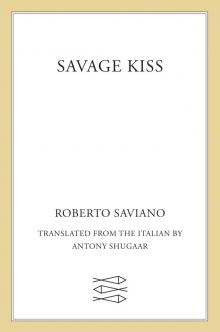 Savage Kiss
Savage Kiss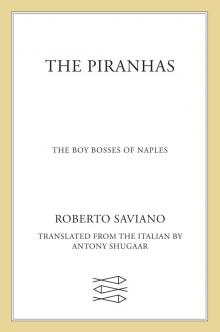 The Piranhas, The Boy Bosses of Naples
The Piranhas, The Boy Bosses of Naples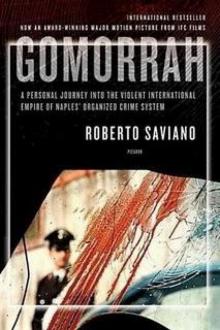 Gomorrah
Gomorrah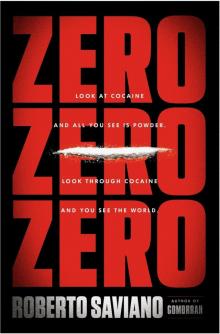 ZeroZeroZero
ZeroZeroZero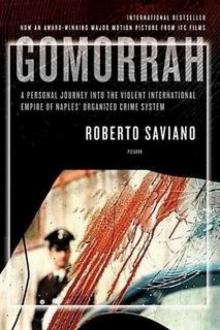 Gomorrah: A Personal Journey into the Violent International Empire of Naples’ Organized Crime System
Gomorrah: A Personal Journey into the Violent International Empire of Naples’ Organized Crime System